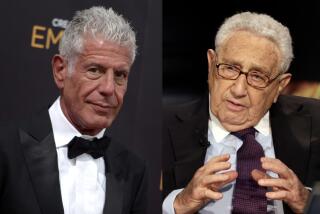POWs Were Left in Laos, Nixon Aides Believed
- Share via
WASHINGTON — Two former defense secretaries under Richard M. Nixon testified Monday that the U.S. government believed in 1973 that many American fliers remained in enemy hands in Laos and were not returned with other prisoners at the end of the Vietnam War, despite Nixon’s public assurances to the contrary.
“As of now, I can come to no other conclusion. (But) that does not mean there are any alive today,” said former Defense Secretary James R. Schlesinger, who also once served as head of the CIA.
The sworn testimony by Schlesinger and Melvin R. Laird, Nixon’s first Pentagon chief, marked the first time that top-ranking members of the Nixon Administration had been questioned publicly about the fate of U.S. servicemen still listed as missing in action almost 20 years after the United States withdrew from Vietnam.
In effect, their testimony before the Senate Select Committee on POW-MIA Affairs corroborated earlier statements by Ross Perot, the Texas tycoon who has been deeply involved in POW-MIA activities since 1969. Perot told the Senate panel last month that the evidence was “overwhelming” that POWs were left behind after the Vietnam War ended.
The testimony also supports the judgment of many members of the Senate’s special POW-MIA committee and is the most authoritative evidence so far of what was once an unthinkable conclusion--that the American government essentially wrote off pending POW-MIA cases at the war’s end in an effort to close the book on the foreign policy disaster.
“I think it’s quite extraordinary when two former secretaries of defense both give evidence documenting that they had information, or they believed personally, that people were alive and not accounted for in Operation Homecoming,” said Sen. John Kerry (D-Mass.), chairman of the select committee.
The former defense chiefs’ remarks are likely to escalate demands by servicemen’s families that more be done to pressure the Vietnamese and other governments for an accounting of the fate of the missing.
The day’s events set the stage for today’s appearance by Henry A. Kissinger, who conducted secret talks with the North Vietnamese in Paris on the terms he negotiated for release of the POWs and for a full accounting of hundreds of others declared missing.
Kissinger--who served as national security adviser and secretary of state under Nixon--is certain to be asked about documented discussions within the Nixon Administration about using military force or strong diplomatic pressure on behalf of an estimated 350 Americans who were believed to be held by enemy forces after their planes were shot down over Laos.
Questioning by Kerry indicated that Kissinger would be asked whether those Americans believed to have been held in Laos were written off as expendable in an effort to cut short the bitter and politically divisive war.
Schlesinger, who said the Pentagon had been in contact with some of the downed fliers after they parachuted to safety, speculated that some of them may have been executed. Kerry said others may have been killed in combat on the ground or died of exposure in the jungle.
In his testimony, Laird, a former Wisconsin congressman who pushed for “Vietnamization” of the conflict so American troop levels could be reduced after 1969, said the Pentagon had solid information, such as letters or direct contacts, on about 20 American airmen who survived in Laos after their planes were shot down.
While he did not say how many prisoners he believed were not properly accounted for, Laird said he was disappointed by the list of 10 names that the Laotians had released to U.S. negotiators through the North Vietnamese.
A memo to Kissinger from Defense Secretary Elliot L. Richardson, dated March 28, 1973, said the Defense Intelligence Agency listed more than 350 Americans as missing or captured in Laos at the time the list was provided by the Laotians.
A day later, however, Nixon declared in a television address to the nation that as a result of the Paris peace talks, “all of our American POWs are on their way home.”
Not long afterward, 527 POWs, mainly held by North Vietnam, did return in the dramatic Operation Homecoming.
“I think it was unfortunate to be that positive,” Laird said of Nixon’s assertion that all POWs would be returned. “You can’t be that positive when we had the kind of intelligence we had when I left.”
More to Read
Sign up for Essential California
The most important California stories and recommendations in your inbox every morning.
You may occasionally receive promotional content from the Los Angeles Times.













